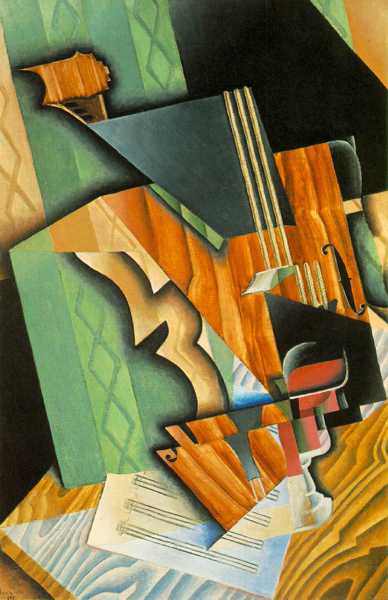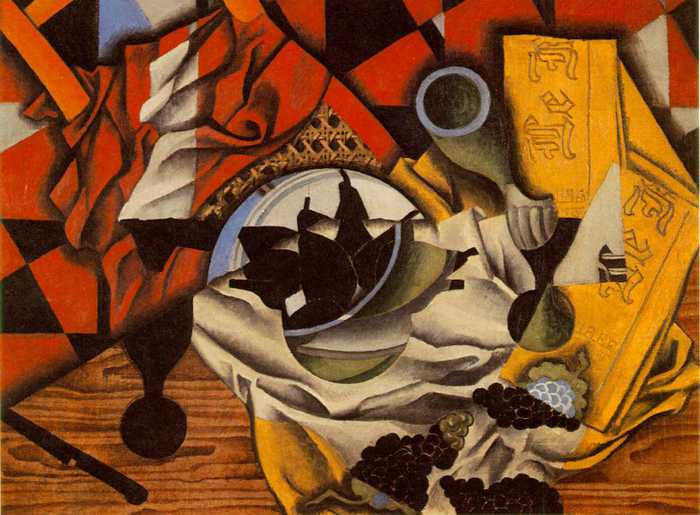® مدير المنتدى ® رسالة sms : عدد المساهمات : 11575 الاٍقامة : وراء الأفق حيث لاشئ سواى وحبيبتى العمل : مهندس نوسا البحر :   2012-03-23, 9:18 am 2012-03-23, 9:18 am | | أشهر
لوحات الرسام خوان غريس - Juan Gris
معلومات عن خوان غريس
الرسام الإسباني خوان غريس من مواليد 23 مارس 1887 في مدريد إسبانيا ، وقد عاش وعمل
تقريبا كل حياته في فرنسا،
تلقى دراسته الأولى في مدريد، وانصرف عن دراسة الهندسة ليلتحق بمرسم الفنان خوسيه
ماريا كربونيرو.
ثم بدأ تدريس الرسم باعتماد مبادئ الفن الجديد ، ولكنه ما لبث أن غادر مدريد واتجه
نحو باريس منجذباً بمجد ابن بلده الصاعد بابلو بيكاسو، وحركتها الثقافية المتمثلة
بالشعراء والفنانين: غيوم أبولينير وماكس جاكوب وبيير ريفري وغيرهم.
وقد أسهم إسهاماًً مهماً في تهيئة مرحلة التصوير التكعيبي الثانية المرسومة بـ
التكعيبية التحليلية وتطويرها، وتجلى ذلك في السطوح المستوية ودوامها، وتركيب
العناصر المتينة، وفي اتحاد الفراغ مع عناصر التكوين،
وبهذا يكون خوان غريس قد أحدث ثورة تشكيلية في بداية القرن العشرين.
كان خوان غريس في مرحلة فنية متقدمة عندما أرسى قواعد التصوير الجاد، تلك القواعد
التي تتطلب من مرسيها مستوى رفيعاً من العلم والمعرفة وإمكانات فكرية خاصة،
فكان بذلك أول من بيَّن الجوانب النظرية والجمالية في العمل الفني باستخدام التلصيق
، والأوراق المصمغة التي استعملها عقب استعمال بيكاسو إياها عام 1912،
ثم تطور تصوير خوان غريس بالإنسلاخ شيئاً فشيئاً عن أقرانه مؤكداً اليسر والسهولة
في مزجه الألوان باعتماد النهج الاتباعي في تشكيل البنية المعمارية للأشكال التي
منحها حياة مهيبة شبه دينية.
وقد توفي هذا الفنان التشكيلي في تاريخ 11 مايو 1927 في مدينة بولوني بيلانكور
الفرنسية.
بعضاً
من أجمل وأشهر لوحات الرسام الإسباني خوان غريسهذه
هي أشهر لوحاته : بورتريه بابلو بيكاسو - وقد رسمت عام 1912م ومساحتها 74 × 93
سمزيت على قماش من مقتنيات معهد الفن في شيكاغو لوحة لوحة
رجل في المقهى - عام 1912
 لوحة لوحة
الكتاب - عام 1913م لوحة لوحة
الكمان ورقعة الداما - عام 1913 Juan
Gris(1887-1927) Cubist
Still Life Painting  Still Still
Life with Violin and Glass
(oil on canvas, 1915)
Fogg
Art Museum, Harvard Cubism
was the the first abstract art form and the most revolutionary
art movement of the 20th century. It was originally conceived
and developed in France by Pablo Picasso and Georges Braque
around 1907, but other artists soon adopted the style. The
Spanish artist Juan Gris (his real name was José Victoriano
González-Pérez), a friend and neighbour of Picasso
in Paris, was the best of these and he refined the cubist
vocabulary into his own instantly recognisable visual language.  Still Still
Life with Open Window, Rue Ravignan
(oil on canvas, 1915)
Philadelphia
Museum of Art Still
life was the most popular of the cubist themes as it allowed
artists to use everyday objects whose forms were still recognisable
after they had been simplified and stylised. 'Still Life with
Open Window, Rue Ravignan' is a great example of Gris' cubist
style. It contains some of the traditional objects commonly
associated with still life: a bowl of fruit, a bottle and
a glass, a newspaper and a book, all carefully arranged on
a table top at a balcony window. The objects are lit by electric
light which contrasts with the moonlit scene outside the window.
The subject may have been clichéd and predictable but
its arrangement was revolutionary. Juan
Gris was more calculating than any other Cubist painter in
the way he composed his pictures. Every element of a painting
was considered with classical precision: line, shape, tone,
colour and pattern were carefully refined to create an interlocking
arrangement free from any unnecessary decoration or detail.
Gris
flattens the composition of 'Rue Ravignan' into a grid of
overlapping planes. Within the structure of this grid, he
delicately balances and counterbalances different areas of
the work. Sections shift from light to dark, positive to negative,
monochrome to colour, transparency to opacity, and from lamplight
inside the room to moonlight outside. The relationships of
these juxtaposed elements leave us with a sense of the still
life group in its surroundings - the kind of fragmented sense
that our memory would retain had we seen them for ourselves. [center] A
New Way of Seeing  Still Still
Life with Pears and Grapes on a Table
(oil on canvas, 1913)
Burton Tremaine Collection, Meriden, CT Before
Cubism,
all art obeyed the convention of perspective.
This was the technique that artists had used since the Renaissance
to arrange objects in space. However, perspective only works
from one fixed viewpoint and the Cubists believed that it
was a limited visualization technique which did not reflect
the way that we see the world. Their aim was to develop a
new way of seeing which reflected the complexity of the modern
age. In Cubist painting artists depict real objects, but not
from a fixed viewpoint as in perspective. They combine different
viewpoints of a subject in the one image. The whole idea of
space is rearranged – the front, back and sides of the
subject become interchangeable elements. Cubist images combine
the artist’s observation with their memory of the subject
to create a poetic evocation of the theme. Juan
Gris' 'Still Life with Open Window, Rue Ravignan' is a classic
example of the style which contains most of the visual characteristics
of the Cubist technique.
- Gris
studied engineering drawing before he became an artist.
- He
was a friend and neighbour of Picasso
in Paris.
- After
Picasso and Braque, Juan Gris is thought of as the third
Cubist
but he was the artist who was the most consistently dedicated
to the style.
- Although
his paintings may appear quite methodical in their design
he was quoted as saying, “I prefer the emotion
that corrects the rule.” which suggests his instinct
and not his intellect was the controlling factor in his
art.
- Gris
also created sculptures and worked on set designs for Diaghilev's
ballets.
- Juan
Gris died at the young age of 39.
[/center] | |
| |











